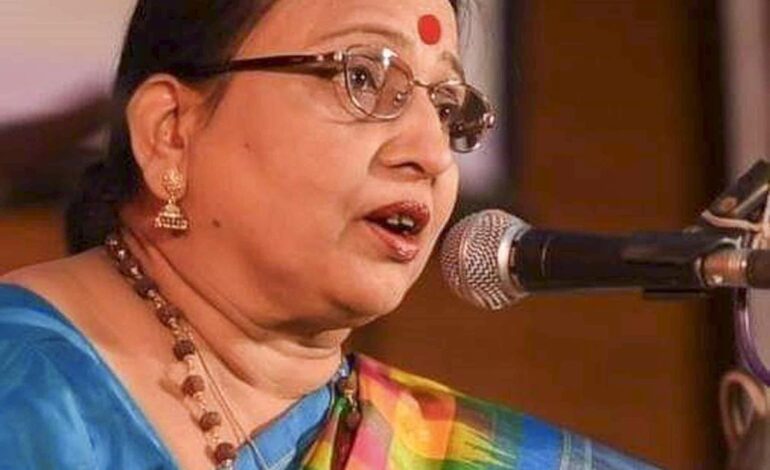
Folk singer Sharda Sinha’s contribution to Chhath Puja will be remembered forever
The music world is mourning the demise of Sharda Sinha, fondly known as the ‘Nightingale of Bihar’, who passed away on November 5 at the age of 72, leaving a profound legacy in the realm of Indian folk music. Her contribution to Chhath Puja music is legendary, with 65 songs dedicated to the festival alone.
Known for her mesmerizing voice and deep-rooted connection to Bhojpuri, Maithili, and other folk traditions, Sharda Sinha was a beloved figure not only in her home state of Bihar but across India.
Born on October 1, 1952, in Hulas village, Supaul, Bihar, she was the only daughter among eight siblings, a cherished and celebrated presence in her family.
Her father, Sukhdev Thakur, worked in the education sector, and it was he who encouraged her early passion for singing.
This encouragement led her to the Bharatiya Nritya Kala Kendra, where she formally trained in music, later completing her graduation and post-graduation in the field.
Sharda Sinha’s voice became synonymous with festivals, particularly Chhath Puja, where her renditions were woven into the cultural fabric of Bihar.
She had been battling multiple myeloma, a form of blood cancer, since 2017 and was under special treatment at AIIMS, Delhi’s Cancer Institute.
Despite her health struggles, her resilience shone brightly and only days before her passing, her son Anshuman Sinha released her latest song, bringing joy to her countless fans celebrating Chhath Puja.
Her passing marks the end of an era in Indian folk music.
Sharda Sinha, a towering figure in Indian folk music, brought Bhojpuri and Maithili songs to widespread acclaim, bridging cultural divides across Bihar and beyond.
Born in Supaul, part of the culturally rich Mithila region, her roots lay in Maithili music, which she initially embraced. Her life took a transformative turn in 1970 when she married Braj Kishore Sinha, a Bihar Education Service officer from Begusarai.
However, her journey as a folk artist faced early hurdles. Sinha often recounted in interviews how her mother-in-law initially disapproved of her singing, even restricting her from performing in the family’s village temple, the Thakurbari.
Over time, though, her mother-in-law came to accept her art.
By 1971, Sharda Sinha began receiving offers from major music companies, marking the start of her formal music career.
Alongside her artistic pursuits, she pursued academic excellence, earning a Ph.D. and joining Samastipur College as a lecturer before ultimately rising to the role of professor.
Sinha’s impact on folk music, especially Bhojpuri, cannot be overstated.
While her foundation was in Maithili music, she expanded her repertoire to include Bhojpuri, Bajjika, and Hindi, making folk music accessible to people outside traditional Bhojpuri-speaking areas.
Her efforts brought Bhojpuri songs into the mainstream, allowing them to resonate across the cultural landscape of Bihar and India.
For many, she became the definitive voice of Bhojpuri music, celebrated during festivals, especially Chhath Puja, which her songs continue to enliven.
She is survived by her daughter Vandana Sinha, and son Anshuman Sinha, who, like countless fans, have been deeply inspired by her remarkable legacy.
Sharda Sinha’s life was marked not only by her immense musical talent but also by recent personal hardships.
Just a month and a half before her passing, her husband, Braj Kishore Sinha, passed away on September 22 at the age of 80.
Sharda herself had retired five years prior from her role as a professor, concluding a distinguished career in academia alongside her musical achievements.
Throughout her career, Sharda Sinha recorded thousands of songs, spanning Maithili, Bhojpuri, Bajjika, and Hindi.
Her music celebrated the essence of Bihar’s cultural life, covering themes of marriage, mundan (a Hindu ritual), jennu (sacred thread ceremonies), and festivals like Chhath.
Many of her songs have become timeless, continuing to bring warmth and authenticity to every festival and life event across generations.
In addition to her folk legacy, Sharda Sinha’s voice found its way into Bollywood, where she captivated audiences nationwide.
Her song ‘Kahe Tose Sajna Tohari Sajniya’ from the iconic film Maine Pyar Kiya remains beloved to this day, despite her famously modest payment of just Rs. 76 for the recording.
She also performed ‘Babul Jo Tune Sikha’ in Hum Aapke Hain Kaun, another heartfelt song that resonated with audiences.
In 2012, her folk-inspired song ‘Taar Bijli Se Patle Hamare Piya’ from Gangs of Wasseypur became widely popular, and more recently, her song ‘Nirmohiya’ from the web series Maharani brought her distinctive voice to a new generation.
Sharda Sinha’s contributions to music have left an indelible imprint on Indian culture, especially in Bihar.
Her songs, celebrated for their enduring appeal, will continue to be cherished across festivals and generations, a tribute to her remarkable legacy.
Her exceptional achievements were first officially recognized by the Government of India in 1991 when she received the Padma Shri award.
In 2000, she was honored with the Sangeet Natak Akademi Award, which is among the highest honors for performing artists in India.
Her legacy was further celebrated with the National Ahilyabai Devi Award in 2006.
Then, in 2018, the Padma Bhushan — India’s third-highest civilian award — was conferred upon her, acknowledging her outstanding contributions to Indian art and folk culture.
Sharda Sinha’s reputation as one of the most renowned singers in Maithili, Bhojpuri, and Magahi is well-deserved.
Her unique ability to make folk music universally appealing allowed her songs to transcend regional boundaries.